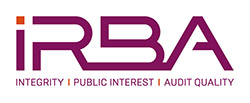IRBA deals firmly with crisis of confidence in accounting and auditing professions
| Johannesburg, Thursday, February 8, 2018 - The Independent Regulatory Board for Auditors (IRBA) CEO Bernard Agulhas, who has been reappointed by the board for a further two years, says that one of his first tasks is to deal decisively with the current crisis in confidence in the accounting and auditing profession, as the regulator seeks to change the Auditing Profession Act 26 of 2005 (APA) to implement harsher sanctions and greater powers for the regulator to discipline errant auditors. The board expressed its support for his reappointment citing the need for someone with international and local expertise in audit as well as a firm and resolute leader which could navigate the current crisis.
Says Agulhas: “We can’t deny that - in the current climate of corporate fraud and corruption - the audit opinion is not as trusted as it once was. To add to that, there is a growing expectation gap between what the public expects an auditor to do and what they are required to do. It is up to the regulator to restore confidence by taking appropriate actions. “However, I must stress that, in a combined assurance environment, there are many layers of governance, so it’s not always true that a business failure means there was also an audit failure. “The expectation gap arises because the public does not understand that the auditor checks if what is presented by management is a fair representation of the company financial statements. Furthermore, if for example there is management intention to manipulate the financial statements in favour of share price and market capitalisation, or to defraud shareholders, management would not make this obvious in their representations to the auditors. This is why the IRBA has been vociferous about the need for audit committees to maintain their independence and ensure they exercise robust scepticism in dealing with the management and the auditors. “While it takes an independent and sceptical auditor to ask the really hard questions of management, which can’t be done when the relationship is too cosy, it equally requires those charged with governance to exercise their oversight independently.” The IRBA was among regulators called to parliament last week to update Members of Parliament (MPs) of three parliamentary committees on the Steinhoff matter. The IRBA reported on a number of actions it has taken in this regard and reminded parliament that it is limited in its jurisdiction, scope and powers to expedite matters. The IRBA only has oversight over registered auditors (RAs). Accountants in practice and commerce do not have the same level of oversight, as the IRBA has no jurisdiction over them. Says Agulhas: “That kind of oversight can only be achieved by a comprehensive regulation model in which the scope of an IRBA investigation could also extend to members of the audit committees and management. Presently, we can only investigate RAs who are registered with the IRBA.” The IRBA had last year indicated to parliament that it sought to table an amendment bill on the APA, which would amongst other things seek to enable the regulator to subpoena information which is not provided by the firms. Delays in investigations are often due to the non-cooperation of firms which delay in delivering the full evidence required for the investigation. Added to that, the investing public is becoming increasingly infuriated that the IRBA appears not to have taken sufficient steps to prevent corporate collapses but, says Agulhas, it is unrealistic as the regulator is shackled to a limited jurisdiction and scope which excludes companies. One of the recourses against felonious directors is for complainants to lay criminal charges. “We’ve had complaints lodged with us against accountants in commerce, but we can’t take action or investigate unless that accountant is also registered as an auditor,” says Agulhas. There are over 40 000 accountants in the country, but only around 4 500 also hold the RA designation. “Our first priority is public protection - the protection of investors, whether direct or indirect – that is why we started a process to amend our Act to revisit our powers of investigation and sanction, and enable the regulator to apply sanctions against auditors which we feel are more in line with the nature of the transgression.” Last week, the Standing Committee on Finance undertook to write to National Treasury to request that the Amendment Bill for the APA must be tabled as soon as possible for the committee to deliberate with a view to passing the bill sooner rather than later. This week the IRBA met with National Treasury to lay out the required changes. Says Agulhas: “Now more than ever the country needs all stakeholders to reinforce their commitment to strengthen regulation and oversight with a view to eradicating corruption and misconduct.” Ends More about the IRBA: The IRBA is a public protection statutory body established to protect the financial interests of the public by ensuring registered auditors and their firms deliver services of the highest quality. It upholds audit firm independence to ensure that audit quality is such that it enhances the accuracy and credibility of financial performance reporting. In this way, the IRBA has an important role to play in building the reputation of South Africa as an investment market for both local and global investors and driving economic growth for the country. The IRBA also registers suitably qualified accountants as auditors, who must adhere to the highest ethics standards, and promotes the auditing profession through the effective regulation of assurance conducted in accordance with internationally recognised standards and processes.
|





